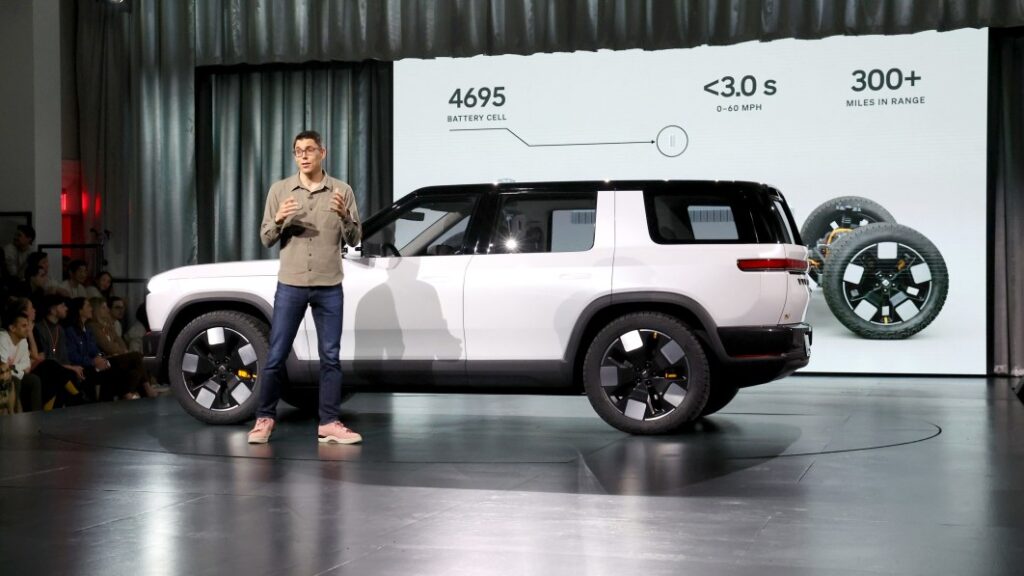EVs aren't exciting anymore. Investors want to hear about software.

Rivian CEO RJ Scaringe.Carlos Delgado/AP
You need more than a battery-powered car to get Wall Street’s attention these days.
The hype train has moved on to EV software.
The latest deal between Rivian and Volkswagen shows how investor interests have changed.
A battery-powered car alone is no longer enough to excite Wall Street.
Many companies are now on the same playing field when it comes to EV range, charging times, and the ability to mass-produce these vehicles. That leaves Wall Street investors looking for something else to set an electric vehicle maker apart: software.
Leading this change in investor interest is, once again, Tesla.
As an ongoing slowdown in the growth of electric car sales finally pinched Elon Musk’s car company this year, the billionaire has been putting more emphasis on the power of Tesla’s software to underpin a driverless robotaxi fleet, which would create an entirely new revenue stream just as sales revenue is shrinking.
The plans helped reverse a weeks-long rout in Tesla’s stock price as Musk once again hyped “a combination of Airbnb and Uber,” that would up utilization of owners’ cars when they’d otherwise sit parked and help them gain value over time — the opposite of what usually happens with new vehicles.
As demand for EVs wanes and Tesla’s plans for a more affordable model are no more apparent, investors have latched onto Musk’s software-based plans for the company.
“The key for Tesla’s stock looking ahead is the Street recognizing that Tesla is the most undervalued AI play in the market,” Dan Ives, a longtime Tesla bull at Wedbush, wrote in a note to clients in early July.
Tesla has a Robotaxi day scheduled for investors next month that Ives says “will lay the yellow brick road to FSD and an autonomous future.”
All aboard the hype train
It appears Tesla’s competitors are recognizing the same change in the hype cycle.
Rivian, which has been facing its own issues with a falling stock price and disappointing financial results, is now riding high after announcing a software joint venture with Volkswagen.
The companies said that Volkswagen will make an initial $1 billion investment in Rivian as part of a software development deal. It’s Rivian’s second high-profile joint venture with a major automaker since it burst onto the scene a few years ago.
The first was a $500 million investment from Ford to build EVs in a joint venture Rivian struck before it had even started production. That deal eventually fizzled, and the companies did not end up building a car together.
Now, heading into the second generation of its pickup truck and SUV lineup, Rivian is joining forces with Volkswagen on the brain of the vehicle.
After losing its post-IPO luster, Rivian has struggled to boost its stock price in recent years despite decent demand for their cars and well-received redesigns and new models announced earlier this year.
In a sign that the hype train has moved on from just EVs to the software that powers them, Rivian’s stock enjoyed a 49% surge in after-hours trading following the announcement of the VW deal.
EV startups have always followed Wall Street’s interests to raise money
Joint ventures like the one between Rivian and Volkswagen have become a common occurrence in recent years, and while the contents of these deals often change, the motivation remains the same.
Startups like Rivian need to follow Wall Street’s interests to keep money flowing. This time, a software-focused deal appears to have done the trick.
As of Friday afternoon, Rivian’s stock was still hovering above its more recent averages, up about 22% since its last closing price before the deal was announced June 25.
The day after Rivian and Volkswagen announced the partnership Bank of America analyst John Murphy praised the deal as a smart money-raising move for Rivian.
Murphy said the deal, totaling $5 billion in investment from VW over time, will aid in funding Rivian’s ongoing production ramp-up of the R2 lineup in Normal, Il, as well as a second factory in Georgia that will house the R3 vehicle platform.
“We have assumed RIVN would need to raise more capital, and VW’s investments in RIVN will prove valuable in helping it achieve the scale necessary to get to positive free cash flow,” Murphy wrote.
While Volkswagen’s stock price hasn’t enjoyed the same ride as Rivian’s, investors are pleased to see the German automaker focusing on improving its software development programs.
JP Morgan analyst Jose Asumendi called the joint venture “a positive step in the right direction to accelerate the transition of VW Group into becoming a more agile entity.”





